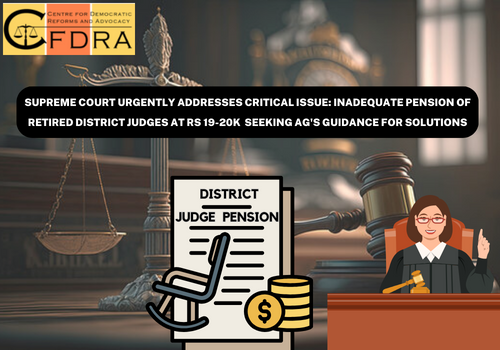The Supreme Court, in a hearing held on February 26, expressed deep concern regarding the pension scheme for judicial officers, specifically highlighting the financial challenges faced by retired district judicial officers. The issue at hand revolves around the insufficient financial support provided through existing pension policies, particularly affecting those who have dedicated years to the cause of justice. Chief Justice of India (CJI) DY Chandrachud drew attention to the dire financial conditions of retired district judges, underscoring the fact that their pensions amounted to as low as Rs 19,000-20,000 despite their years of dedicated service.
CJI Chandrachud emphasized the difficulty faced by retired judges in transitioning to other avenues, especially considering their physical limitations at an age where active legal practice becomes challenging. He stated, “The retired District judges are clocking a pension of Rs 19,000-20,000… after a long service, how do they survive? This is the kind of office where you are completely disabled; you cannot suddenly jump into practice and go to the High Court at the age of 61-62 years and start practicing.”
Supreme Court: CJI Seeks AG’s Assistance in Tackling Disproportionate Pension Woes
In a poignant plea for resolution, CJI Chandrachud beseeched the assistance of the Attorney General (AG), Mr. R Venkataramani, representing the Union in the matter, to collaboratively devise a “just solution” for the retired judicial officers grappling with the challenges posed by an imbalanced pension policy. Acknowledging the gravity of the situation, the AG assured the court that he would thoroughly investigate the matter, signaling a potential turning point in addressing the longstanding issue.

In a plea for a resolution, CJI Chandrachud requested the assistance of the Attorney General (AG), Mr. R Venkataramani, who was representing the Union in the matter, to find a “just solution” for the retired judicial officers facing the hardships of a disproportionate pension policy. The AG, taking note of the seriousness of the issue, assured the court that he would thoroughly look into the matter.
CJI Chandrachud further pointed out that judges from certain High Courts had approached the Supreme Court due to non-release of salary, citing the lack of new General Provident Fund (GPF) accounts allotted to them after their elevation from the district judiciary.
The bench, consisting of Justices JB Pardiwala and Manoj Misra, was hearing the All India Judges Association matter. The court had previously issued directions related to the pay and service conditions of judges, accepting recommendations from the Second National Judicial Pay Commission. In the previous month, the court directed states to clear the arrears by February 29, urging High Courts to establish committees to oversee the implementation.
During the recent hearing, Advocate K Parameshwar, acting as the amicus curiae in the matter, provided insights into the affidavits filed by some states. He highlighted the states’ argument, stating a significant financial burden and the Union’s position, considering it as part of a larger fiscal move to reduce the pension burden in contrast to the GDP ratio. Parameshwar emphasized that states were willing to cooperate, subject to the Union contributing to pension finances. He suggested a potential reevaluation of the judgment based on these factors.
Additionally, Parameshwar pointed out a disparity in the pension amounts between judicial officers who have served the country for 20-30 years and are unable to be promoted as High Court judges compared to their counterparts who make it to the High Court.
Parameshwar stressed the importance of an adequate pension to ensure the judicial independence of an officer. The hearing is set to continue next Monday, indicating a continued effort by the court to address and resolve the complexities surrounding the pension scheme for judicial officers.
Do you want to publish your own book?
We will help you get the best options for book publishing related services in India that helps you to self publish your book professionally. Complete set of publishing services. From designing book covers to publishing, promotion to distribution we provide them all. Click here to get free call back from our team consulting you regarding the publishing costs and the process.